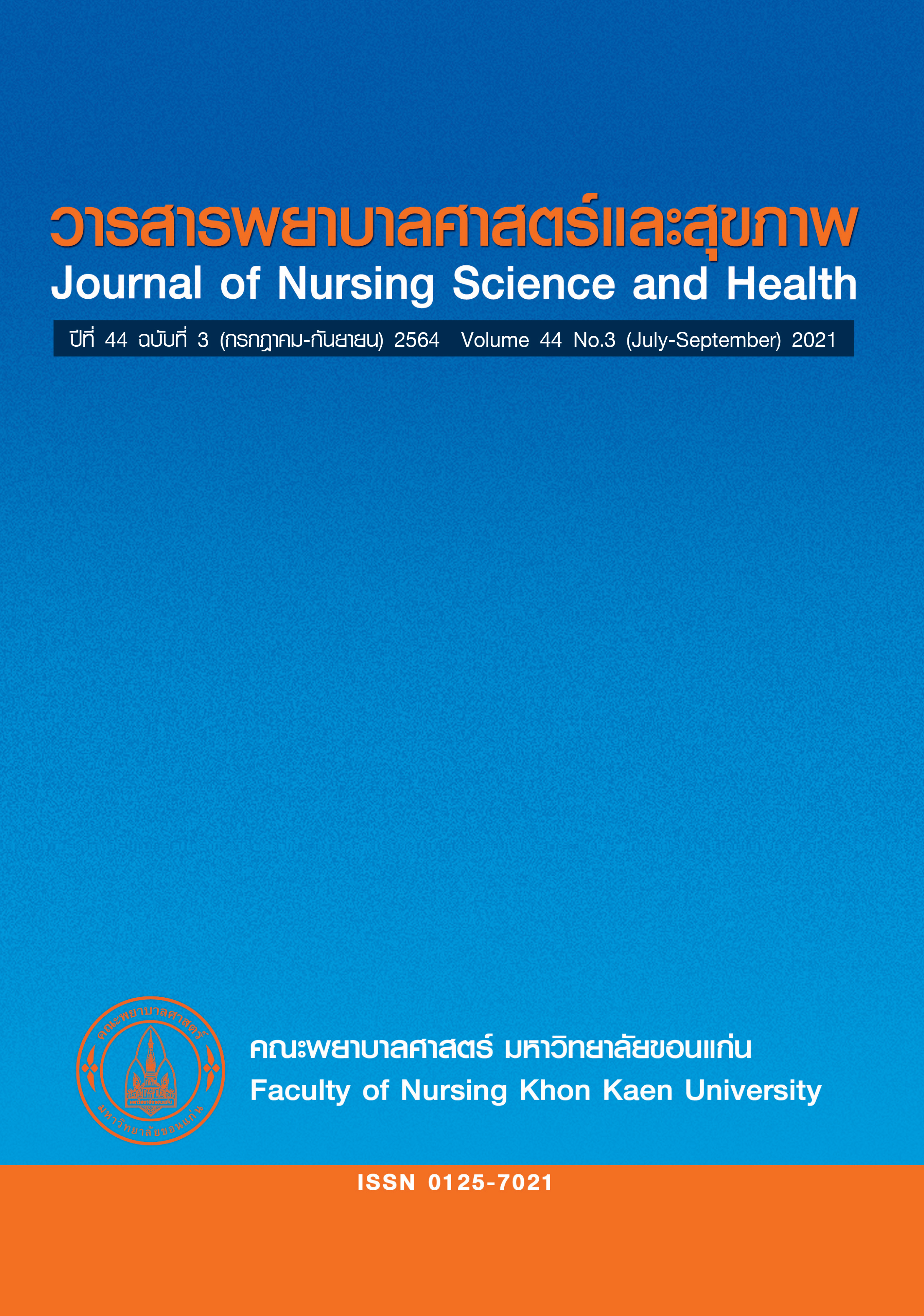ปัญหา ความต้องการ และการสร้างความเข้มแข็งแก่ผู้ดูแลเด็กโรคลมชักโดยประยุกต์ใช้ทฤษฎีระบบ
คำสำคัญ:
เด็กโรคลมชัก, ปัญหาและความต้องการ, ความเข้มแข็ง, ทฤษฎีระบบบทคัดย่อ
โรคลมชัก (epilepsy) เป็นโรคทางระบบประสาทที่มีอาการชักเกิดขึ้นซ้ำกันตั้งแต่ 2 ครั้งขึ้นไป โดยไม่มีสิ่งกระตุ้น ในขณะชักผู้ป่วยเด็กจะไม่รู้สึกตัว ผู้ดูแลจึงมีบทบาทสำคัญในการดูแลผู้ป่วยเด็กเหล่านี้ โดยเฉพาะในเด็กเล็ก หรือเด็กที่ได้รับผลกระทบจากโรคลมชักซึ่งเป็นโรคเรื้อรัง ทำให้ความสามารถในการดูแลตนเองลดลง การสร้างความเข้มแข็งแก่ผู้ดูแลเด็กโรคลมชักโดยประยุกต์ใช้ทฤษฎีระบบซึ่งประกอบด้วย 3 ส่วนคือ 1) ปัจจัยนำเข้า (input) คือ ความรู้ ความสามารถ แรงจูงใจ การสนับสนุนทางสังคม การรับรู้การเจ็บป่วย อุปกรณ์ เครื่องมือ งบประมาณในการดูแล รวมถึงภาวะสุขภาพของผู้ดูแล 2) กระบวนการ (process) คือ กิจกรรมและวิธีการปฏิบัติของผู้ดูแลในการดูแลเด็กโรคลมชัก และ 3) ผลลัพธ์ (output) คือ ภาวะสุขภาพของเด็ก และความพึงพอใจในการดูแลเด็กโรคลมชักของผู้ดูแล การส่งเสริมศักยภาพของผู้ดูแลให้มีความเข้มแข็งในการกระทำบทบาทการดูแลเด็กโรคลมชักอย่างต่อเนื่องได้อย่างมีความสุขตามอัตภาพของตนเอง ส่งผลให้ผู้ป่วยได้รับการดูแลอย่างมีประสิทธิภาพ และผู้ดูแลมีคุณภาพชีวิตที่ดี
เอกสารอ้างอิง
Janjindamai S, Epilepsy. In Jaruratanasirikul S, Laoprasopwattana K, Puwanon M, Tonkhlang N, Editors. Outpatient clinic, Hospital. 3rd ed. Songkhla; Chanmuang press; 2012. (in Thai)
Sakorn K, Limsuwan N, Kuladee S, Khongkhatithum C. Depression in pediatric patients with epilepsy at Ramathibodi Hospital. Journal of the Psychiatric Association of Thailand 2019;64(1): 21-32. (in Thai)
Kangwal C, Kongsaktrakol C, Maneesriwongul W, Visudtibhan A. Factors related to medication adherence among children with epilepsy. Ramathibodi nursing journal 2019;23(1):44-59. (in Thai)
Medical Records Srinagarind Hospital. Statistics data report of pediatrics with Epilepsy 2560-2562. Srinagarind Hospital; 2562. (in Thai)
Sakulrungjalas T, Kongsaktrakul C, Visudtibhan A, Chansatitporn N. Knowledge and attitude towards epilepsy among pediatric nurses in secondary and tertiary hospitals in Thailand. Journal of The Royal Thai Army Nurses 2017; 18 Suppl 1:131-9. (in Thai)
Pandee P, Kiatrungrit K, Kuladee S, Khongkhatithum C, Wisajun P, Jullagate S, et al. Attention-deficit/hyperactivity disorder in childhood epilepsy in Ramathibodi Hospital and Related Factors. Journal of the Psychiatric Association of Thailand 2019;64(1):33-44. (in Thai)
Jarintana P, Kongsaktrakul C, Visudtibhan A. The effects of ability promoting program for caregivers of school-age children with epilepsy using CAI on knowledge, perceived self-efficacy, and outcome expectancy. The Journal of Faculty of Nursing Burapha University 2019;27(1):13-22. (in Thai)
Thamnaw P, Kongsaktrakul C, Patoomwan A. Predictive factors for adaptation among caregivers of children with epilepsy. Ramathibodi nursing journal 2011;17(2):218-31. (in Thai)
Sakulrungjalas T. Effects of epilepsy on children: Prevention and treatment. Thai Journal of Nursing Council 2018;33(4):5-18. (in Thai)
Von Bertalanffy L. General system theory. NewYork: Braziller; 1968.
Sriseang P. Theories and concepts Related to Nursing. KhonKaen: Faculty of Nursing KhonKaen University; 2014. (in Thai)
Maiphom S. Leemingsawat W. Health literacy of caregivers of children with epilepsy. Journal of sports science and health 2020;12(2):269-82. (in Thai)
Hazinski MF. Nursing care of the critically ill child. United States of America: Elsevier; 2013.
Auvichayapat N. Children epilepsy. Faculty of Medicine KhonKaen University: Pediatrics medicine KKU; 2018. (in Thai)
Lee JH, Ju HO, Lee YJ. Effects of an algorithm-based education program on nursing care for children with epilepsy by hospital nurses. Child Health Nursing Research 2019;25(3):324-32.
Borisut S, Bunyarak P, Noppornprom C. Abstract: Effect of guidelines of quality and safety at epilepsy monitoring unit in prasat neurological institute. Journal of the Department of Medical Service 2019; 44(4):137-43.
Srikulwong N, Kantawang S, Jintrawet U. Factors influencing health promotion behaviors. Nursing Journal 2012;39(4):23-33. (in Thai)
Pongwatcharaporn K. Factors predicting poor response to first antiepileptic drug in pediatric epilepsy. Medical Journal of Sriseket Surin Burerum Hospital 2020;35(2):491-500. (in Thai)
Piasupan R, Thanattheerakul C. The effects of educative supportive program using VCD and handbook on caregivers’ caring behaviors for school age epilepsy. Journal of Nursing Science & Health 2017;40 (2):11-21. (in Thai)
Chuaichum C, Jitpanya C. Factors related to medication adherence in patients with epilepsy: A systematic review. Princess of Naradhiwas University Journal 2014;6(1):36-47. (in Thai)
DiPaola F, Molleston JP, Gu J, Cirulli ET, Chalasani N, Barnhart H, et al. Antimicrobials and antiepileptics are the leading causes of idiosyncratic drug – induced liver injury in American children. Journal of Pediatric Gastroenterology and Nutrition 2019;69(2):152-9.
Singsathorn D, Permsirivanich W. Effects of promoting development in ADHD children with a ‘Group Activities Program’ at the queen savang vadhana memorial hospital in Chonburi, Thailand. Burapha Journal of Medicine 2018; 5(2): 70-86. (in Thai)
Jeerasup N, Sukhawaha S, Saguanrum K, Kenbubpha K, Dit-ung H. Development and test effectiveness of a school-based cognitive behavioral group therapy for depression in adolescents. Journal of the Psychiatric Association of Thailand 2020;65(1):47-62. (in Thai)
Matrakul M, Mongkhonittivech N. Situation analysis of care by volunteers for elders with chronic diseases in Mae-Ngoen municipality, Chiang Saen District, Chiang Rai Province. Journal of Nursing Science & Health 2018;41(2):69-77. (in Thai)
ดาวน์โหลด
เผยแพร่แล้ว
รูปแบบการอ้างอิง
ฉบับ
ประเภทบทความ
สัญญาอนุญาต
วารสารพยาบาลศาสตร์และสุขภาพเป็นเจ้าของลิขสิทธิ์ในการเผยแพร่ผลงานที่ตีพิมพ์ห้ามผู้ใดนำบทความที่ได้รับการตีพิมพ์ในวารสารพยาบาลศาสตร์และสุขภาพไปเผยแพร่ในลักษณะต่าง ๆ ดังนี้ การนำบทความไปเผยแพร่ออนไลน์ การถ่ายเอกสารบทความเพื่อกิจกรรมที่ไม่ใช่การเรียนการสอน การส่งบทความไปตีพิมพ์เผยแพร่ที่อื่น ยกเว้นเสียแต่ได้รับอนุญาตจากวารสารพยาบาลศาสตร์และสุขภาพ



